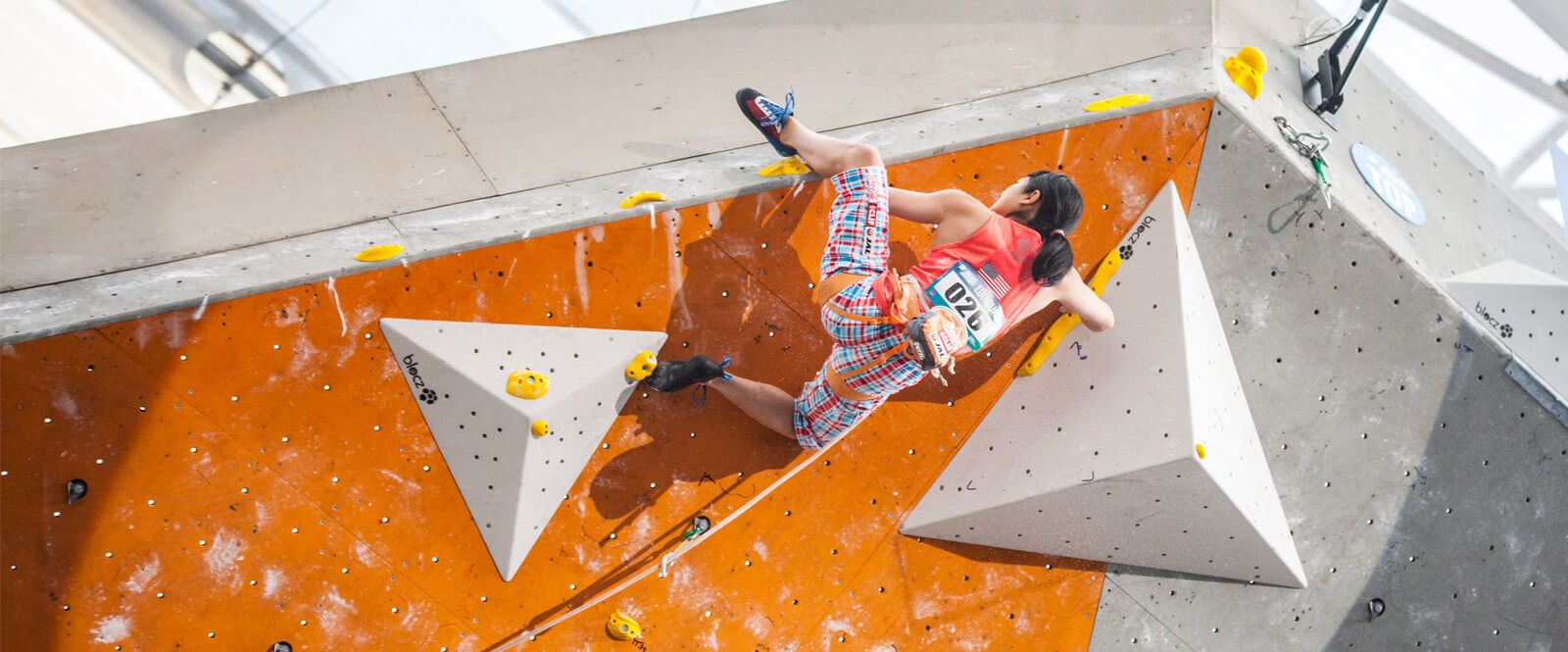04.06.24
Climbing in the Olympics: Everything you need to know
Welcome to the vertical world of Olympic climbing!
Since its debut at the Tokyo 2020 Games, climbing has captured the imagination of sports enthusiasts worldwide. With the Olympic Games Paris 2024 in the horizon, this guide will walk you through the thrilling disciplines of bouldering and lead climbing as they are presented in the Olympics. Discover the rules, techniques, and what it takes to compete at the highest level of this dynamic sport.
The Olympic Games opening ceremony is on Fri 26 July. The climbing competitions will run from 5-10 August. If you enjoy what you see on TV, why not try it yourself?
Olympic Climbing Disciplines
Bouldering
Bouldering in the Olympics challenges climbers with a series of short, dynamic climbs known as ‘problems’, tackled without ropes over soft matting. During fixed time periods in qualification and finals, climbers aim to top as many problems as possible with minimal attempts. This discipline tests their technique, strength, and strategic problem-solving, blending physical prowess with tactical acumen for a compelling display.
Lead Climbing
Lead climbing challenges athletes to climb as high as possible on a tall wall, within a fixed time limit. Lead climbers must secure themselves by clipping a rope into quickdraws positioned along the route. The rope is only used if they fall. Scoring is based on the highest hold reached with a successful clip-in from below that hold. This discipline demands exceptional endurance, precision and mental fortitude, as climbers push their limits.
Speed climbing
Speed climbing features two climbers racing up a 15-metre wall on identical climbs. Emphasising explosive power and speed, this discipline sees athletes aiming to scale the wall as quickly as possible. The world record astonishingly now clocks in under 5 seconds. The standardised climb allows for specific training focused on speed and consistency. The competition is timed to the millisecond, stopping as a climber hits the buzzer at the top, making it a thrilling spectacle of athletic precision.
For more on climbing Olympians and specific event times visit The International Federation of Sport Climbing
Climbing’s Olympic History and Scoring Evolution
Climbing made its Olympic debut at the Tokyo 2020 Games (held in 2021 due to the pandemic), showcasing a unique blend of mental and physical challenges. The introduction of climbing to the Olympic roster marked a significant milestone for the sport’s community, boosting its global visibility and popularity. Initially, the event featured a combined format where athletes competed across multiple disciplines—bouldering, lead climbing, and speed climbing—to earn a cumulative score that determined the overall medallists.
“With a Speed event and a combined Boulder & Lead event in Paris, the total number of medal events for Sport Climbing will double from two at the Tokyo Games, to four in Paris. The Olympic Games will also see a significant increase in the number of Sport Climbing athletes participating in comparison to the Tokyo Games, from 40 athletes in Tokyo, to 68 in Paris.” IFSC
Looking ahead to the Paris 2024 Olympics, significant changes are set to refine this scoring system. Reflecting the sport’s growth and importantly the distinct skills required by each discipline, the new format will award separate medals for bouldering, lead climbing, and speed climbing. This change not only celebrates the specialised skills that top climbers bring to each discipline but also promises to heighten the competitive drama for audiences and participants alike.
Climbing is for everyone
Embrace the fun side of fitness. Are you bored of the gym?
Climbing offers a unique mix of physical exercise, mental stimulation and social interaction, making it a fulfilling sport for people of all ages. You can start bouldering at any age and over 70s climb for free at all TCA centres. It builds strength, improves problem-solving skills and fosters a supportive community atmosphere. Whether you are looking for a fun way to stay active or a new competitive challenge, climbing has something to offer.
Book a taster
Join our Olympic Tasters sessions at The Climbing Academy this summer. Try your hand at bouldering and top-roping in a friendly and supportive environment. Top-roping is the first step on the ladder of roped climbing. We also offer lead courses in Bristol, Chippenham and Glasgow. Whether you’ve tried it before or are a complete beginner, a Taster is a fun session with instructors. So why not grab some friends or family and book your taster session today and kick start your climbing journey!




